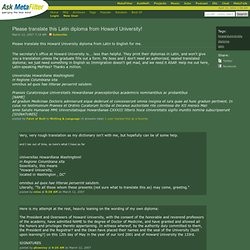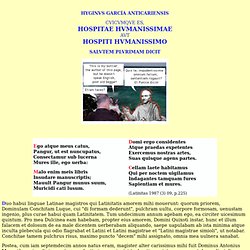

Lexicon Recentis Latinitatis, parvum verborum novatorum Léxicum. WELCOME TO THE WORLD OF LIVE LATIN. Why speak Latin?

Isn't Latin a dead language? There is nothing further from the truth. This is not simply a mistake; it is a rank falsehood that has long been believed. This idea of a "dead language" appeared in the late XVIIIth century when the French, wishing their own language to become the universal language, forged it so as to exclude Latin, which, up until then, had been the one universal language. However, Latin, as a language for use has never ceased living right up until our days. Here are some texts on the subject in differents languages: Pourquoi le latin aujourd'hui. Latin today.
Como (no) se enseña el Latin. Por qué hablar y escribir latín hoy día. Nuntius pro lingua Latina. O Latinitas! Lebendiges Latein. L'Europa alla ricerca di una lingua comune. De Latine loquendo et scribendo hodiernis temporibus. De praestanti methodo docendi ac discendi linguam latinam. Après Avignon. And now for some examples of live Latin (or modern Latin): Nuntii Latini 16.5.2003. LATIN & GREEK - linguae. Lingua Latina Aeterna. Goethe Robinson Schiller Stevenson ... lateinisch griechisch. Rebilii Crusonis Annalium caput primum. Septimana latina (this week in latin) Philia - Acta diurna. S A L. SALVI: Septentrionale Americanum Latinitatis Vivae Institutum.
Diploma Latin: Degree Titles. Please translate this Latin diploma from Howard University! - howarduniversity diploma latin. Please translate this Howard University diploma from Latin to English for me.

The secretary's office at Howard University is... less than helpful. They print their diplomas in Latin, and won't give you a translation unless the graduate fills out a form. My boss and I don't need an authorized, sealed translated diploma; we just need something in English so Immigration doesn't get mad, and we need it ASAP. Help me out here, Latin-speaking MeFites? Thanks a million. Universitas Howardiana Washingtonii in Regione Columbiana sita omnibus ad quos hae litterae peruerint salutem.
Praeses Curatoresque Universitatis Howardianae praeceptoribus academicis nominantibus ac probantibus [NAME] ad gradum Medicinae Doctoris admiserunt eique dederunt et concesserunt omnia insignia et iura quae ad hunc gradum pertinent. A Dictionary of Modern Latin. Duo habui linguae Latinae magistros qui Latinitatis amorem mihi mouerunt: quorum priorem, Dominulam Conchitam Luque, cui "di formam dederunt", pulchram uultu, corpore formosam, uenustam ingenio, plus curae habui quam Latinitatem.

Tum undecimum annum agebam ego, ea circiter uicesimum quintum. Pro mea Dulcinea eam habebam, propter eius amorem, Domini Quixoti instar, hunc et illum falacem et dolosum de ea male dicentem uerberabam aliquando, saepe uapulabam ab ista minima atque inculta plebecula qui odio flagrabat et Latini et Latini magistrae et "Latini magistrae simioli", ut notabar. Conchitae tamem pulchrus risus, maximo puncto "decem" mihi assignato, omnia mea uulnera sanabat. Latinitas in tela totius terrae. Tunberg's Books. Recent Latin. Recent Latin is the form of Latin used from the late nineteenth century down to the present. Unlike all previous varieties of Latin, it is neither used as a living language nor as a textual vehicle for literature, philosophy, and science; instead, it is primarily used as a form of entertainment, practiced among a small group of Latin devotees.
Decline of New Latin The New Latin of the 17th to 19th centuries had become otiose by 1900, confined to a few very technical areas (e.g., botany) where it functioned as a code, capable of only very limited types of expression, and not as a fully functional language. In other fields (e.g. anatomy or law) where Latin had been widely used, it survived only in technical phrases and terminology. Emergence of Recent Latin The emergence of Recent Latin can be traced back at least to the late nineteenth century . It has also been used as a spoken language from the beginning in numerous summer conferences throughout Europe, and more recently in America. Notes. Retiarius.